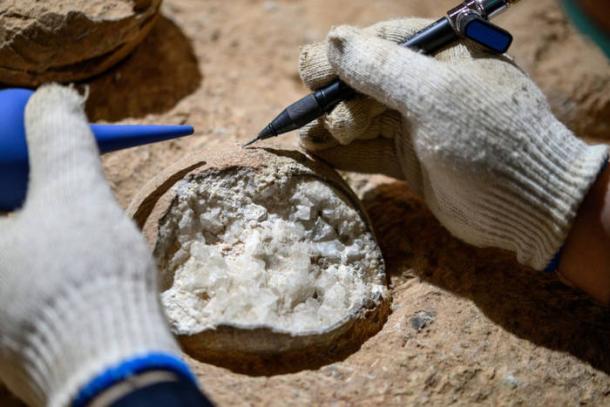Science
Scientists Date Dinosaur Eggs at 85.91 Million Years Old

A team of scientists in China has made a significant advancement in paleontology by successfully dating dinosaur eggs for the first time. The research reveals that these ancient eggs are approximately 85.91 million years old. Conducted at the Qinglongshan site in Hubei Province, this study employs an innovative “atomic clock” dating method, which could transform our understanding of dinosaur evolution and the climate changes during the Late Cretaceous period.
These dinosaur eggs belong to the species Placoolithus tumiaolingensis, providing valuable insights into a critical time when Earth’s climate was undergoing substantial cooling. This cooling period may have played a role in the patterns of dinosaur extinction. The clutch of eggs discovered at the Qinglongshan site consists of 28 eggs, with most attributed to the same species, underscoring the importance of this fossil find.
Innovative Dating Technique Enhances Research
The atomic clock dating technique used in this research is a breakthrough in paleontological studies. It offers a more precise method for determining the age of fossils compared to traditional dating methods. According to lead researcher Bi Zhao, this technique allows scientists to gain a clearer picture of the environmental conditions that dinosaurs faced during their last days on Earth.
The findings not only shed light on the age of these remarkable fossils but also open new avenues for understanding the ecological dynamics during the Late Cretaceous. This period is notably marked by significant climatic shifts, which have implications for the survival and eventual extinction of dinosaur species.
In addition to providing critical data on the Placoolithus tumiaolingensis, the research emphasizes the broader impact of climate change on prehistoric life. By exploring these relationships, scientists hope to draw parallels with contemporary climate issues.
Implications for Future Research
The dating of these dinosaur eggs marks a pivotal moment in paleontological research, as it provides a direct look into a time when dinosaurs thrived. The implications of this study extend beyond the individual species, suggesting a need for further exploration into how climatic changes influenced dinosaur populations.
This research has garnered attention not only for its scientific significance but also for its potential to engage a wider audience in the history of life on Earth. As more discoveries are made using advanced techniques like atomic clock dating, our understanding of the complex interactions between prehistoric life and their environments will continue to evolve.
The study has been published in the journal Frontiers, showcasing the importance of collaborative research in unveiling the mysteries of our planet’s past. With the Qinglongshan site serving as a focal point for future investigations, scientists are eager to uncover more about the life forms that existed millions of years ago and how they adapted to changing climates.
-

 Top Stories2 days ago
Top Stories2 days agoTributes Surge for 9-Year-Old Leon Briody After Cancer Battle
-

 Entertainment2 months ago
Entertainment2 months agoAimee Osbourne Joins Family for Emotional Tribute to Ozzy
-

 Politics2 months ago
Politics2 months agoDanny Healy-Rae Considers Complaint After Altercation with Garda
-

 Top Stories1 day ago
Top Stories1 day agoNewcastle West Woman Patricia Foley Found Safe After Urgent Search
-

 Top Stories1 month ago
Top Stories1 month agoIreland Enjoys Summer Heat as Hurricane Erin Approaches Atlantic
-

 World2 months ago
World2 months agoHawaii Commemorates 80 Years Since Hiroshima Bombing with Ceremony
-

 Top Stories2 months ago
Top Stories2 months agoFianna Fáil TDs Urgently Consider Maire Geoghegan-Quinn for Presidency
-

 Sports1 day ago
Sports1 day agoConor Murray Reflects on His Career in New Autobiography
-

 World2 months ago
World2 months agoGaza Aid Distribution Tragedy: 20 Killed Amid Ongoing Violence
-

 World2 months ago
World2 months agoCouple Convicted of Murdering Two-Year-Old Grandson in Wales
-

 Top Stories2 months ago
Top Stories2 months agoClashes Erupt Between Far-Right Groups and Migrants in Spain
-

 World2 months ago
World2 months agoAristocrat Constance Marten and Partner Convicted of Infant Murder









